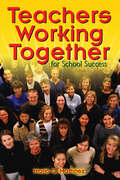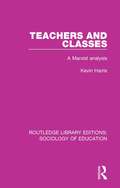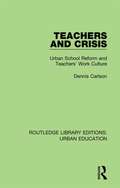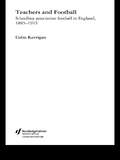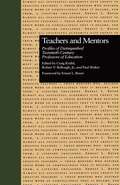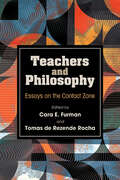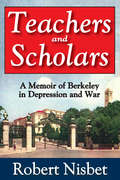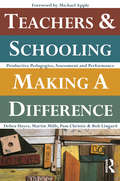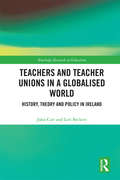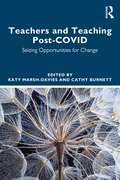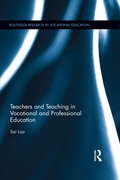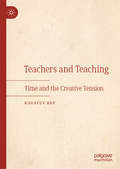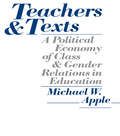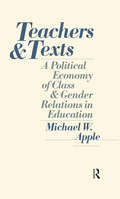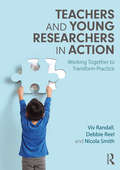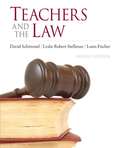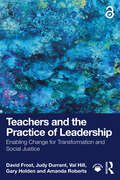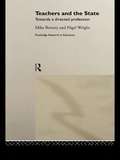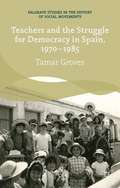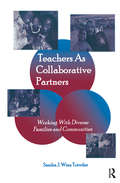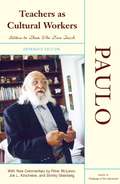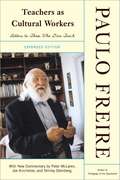- Table View
- List View
Teachers Working Together for School Success
by Mario C. MartinezThrough examples, illustrations, and self-assessments, this volume provides the tools teachers need to build the productive working relationships that are the foundation of successful schools.
Teachers and Academic Partners in Urban Schools: Threats to professional practice (Teacher Quality and School Development)
by Lori Beckett'Showing how critical thinking and local democracy can be a spur to very real educational development within schools that are facing severe challenges, this book provides us with one very valuable contemporary resource of hope.' Ian Menter, Professor of Teacher Education, University of Oxford, UK Teachers and Academic Partners in Urban Schools identifies and addresses a major problem for practitioners – teachers, student teachers and teacher educators – working in urban schools burdened by highly restrictive teaching methods and pressures to meet unrealistic benchmarks set by government. In this book, Lori Beckett investigates how to negotiate these tensions and challenges and offers an account of how to elevate practitioners’ professional voice on quality teaching along more democratic lines. The book addresses key issues for teachers in urban schools, such as: fractures in teachers’ professional communities; impacts of imposed marketizing policies and forced performative practices on schools; the complexities of teaching and teachers’ concerns about practice, as well as teaching practitioners’ perception of educational/schools policy. Both academic and teacher partners contribute to the work, showcasing the ways they have engaged with each other in joint work and with local government. Through this, the book supports a professional and politicized dialogue about teaching and teacher education, offering a meaningful account of how to fashion a form of educative schooling for students and families with complex needs. Written by a dynamic and experienced author, this book brings Beckett’s experience to bear on a controversial and complex area – addressing the general trend towards increased regulatory policy in education. It is an essential read for anyone interested in a rich analysis of how practitioners can work to reassert their professional voice and regain control of schools and teacher education, and will also appeal to those interested in the larger project of restoring school democracy.
Teachers and Classes: A Marxist analysis (Routledge Library Editions: Sociology of Education #28)
by Kevin HarrisIn this study, first published in 1982, the author draws on his considerable experience at all levels in the school system to present a radical Marxist critique of that structure. He argues that the schooling process within contemporary corporate capitalism is inimical to education, while true education in turn is inimical to capitalism. He argues further that teachers, who are participants in ongoing class struggle, can begin to be concerned primarily with education only when they perform the function of the collective labourer. This title will be of interest to students of education and sociology.
Teachers and Crisis: Urban School Reform and Teachers' Work Culture (Routledge Library Editions: Urban Education #1)
by Dennis CarlsonAdvocates of the ‘back-to-basics’ movement argue that a basic skills programme ensures that students are educated to a minimum level of literacy required to enter the labour force. Critics charge that these efforts only increase school bureaucracy and undermine teachers’ autonomy in the classroom. First published in 1992, this book moves beyond the rhetoric surrounding the basic skills debate by providing a thorough yet critical examination of urban education, urban school reform, and teachers’ work culture. Beginning with a sparkling theoretical discussion of the problems and pitfalls of back-to-basics reform efforts, author Dennis Carlson argues persuasively that the movement’s exclusive emphasis on functional literacy skills rather than higher-order thinking assures that students will remain on the lower rungs of the socio-economic ladder. He then proceeds with an empirical study of two urban high school districts in which he documents the latent effects of back-to-basics on teachers’ work lives as well as staff-administration clashes over efforts to implement restructuring programmes. This book offers a sensible and sophisticated treatment of some of the important issues facing urban education and will be of great interest to anyone working in Education.
Teachers and Football: Schoolboy Association Football in England, 1885-1915 (Woburn Education Series)
by Colm KerriganThe 1870 Education Act that opened up elementary education for all children contained no provision for outdoor games. This book explains how teachers, through the elementary school football association, introduced boys to organized football as an out-of-school activity. The influence and significance of this work, insofar as it relates to the elementary school curriculum and the growth of professional and amateur football are explored in detail, including:* How ideological commitments and contemporary concerns for the physical welfare of children in cities may have led teachers to promote schoolboy football when it was not permitted during school hours* The extent to which out of school organised football may have led to outdoor games being accepted as part of the school curriculum* How elementary school football in London in the late nineteenth century influenced the development of the amateur game.This is a fascinating account of the origins of schoolboy football and the factors that have influenced its development and the consequences and benefits that have followed not only for school football but for sport in schools and communities as a whole.
Teachers and Mentors: Profiles of Distinguished Twentieth-Century Professors of Education (Source Books on Education #48)
by Paul Shaker Craig Kridel Robert V. Bullough, Jr.First Published in 1996. Routledge is an imprint of Taylor & Francis, an informa company.
Teachers and Philosophy: Essays on the Contact Zone (SUNY series, Horizons in the Philosophy of Education)
by Cara E. Furman; Tomas de Rezende RochaPhilosophers and educators come together to address contemporary issues in education.Teachers and Philosophy showcases the potential of education practitioners and philosophers of education working and writing together. Following Mary Louise Pratt, this meeting space is referred to as a "contact zone," and contributors demonstrate the power and benefit of writing from this liminal space. Introductory and concluding chapters provide an argument for the value of bringing together philosophers and practitioners as well as tips for facilitating these interactions. Situated amid the COVID-19 pandemic, the volume grapples with the challenges that practitioners face around teaching controversial topics, crafting inclusive curricula, indigeneity, dis/ability, urban schooling, nature-based education, rural education, mental health, coping with feelings of anger, and more. Each chapter ends with suggestions for further reading or engagement, questions for reflection and discussion, and an activity that a class or reading group can move through together.
Teachers and Scholars: A Memoir of Berkeley in Depression and War
by Robert NisbetThe University of California at Berkeley is today best known as a great research center and popularly remembered as a locus of campus unrest in the 1960s. This memoir by the eminent sociologist and historian of ideas Robert Nisbet views Berkeley from a different perspective. Teachers and Scholars is a fascinating picture of Berkeley as it was a half a century ago in its move to become the most important center of learning west of the Mississippi. Nisbet recounts his years there as student and teacher, and offers vivid portraits of Berkeley's professors and personalities.Between the Great Depression and entry into World War II, Berkeley was a unique window on a Western world in turmoil. All the ideologies of the time liberalism, socialism, populism, and fascism impinged on the life of the campus. In Nisbet's view, the thirties was the last decade of "the old Berkeley" a school that conceived its primary mission as that of teaching. Although research was expected of every faculty member, its chief importance was widely held to be in its elevating effect on undergraduate instruction.In the shift from teaching to research, some have argued that Berkeley has lost community and consensus while others claim that the university has only enriched itself. Nisbet finds much to respect and criticize in both views. His vision permits him to compare and contrast the Berkley experience with other schools such as Harvard, Chicago, and Stanford. Rich in intellectual and social history, Teachers and Scholars is vitally pertinent to the educational questions and controversies of our own time.
Teachers and Schooling Making A Difference: Productive pedagogies, assessment and performance
by Debra Hayes Martin Mills Bob Lingard Pam ChristieTeachers + Schooling Making a Difference takes seriously the question that teachers ask, 'What do I do on Monday?' and does provide answers.'From the foreword by Professor Michael Apple, University of Wisconsin Education debates are currently dominated by free-market ideologists who push privatisation and competition as the answer to every problem, regardless of damage to schools and pupils. Teachers + Schooling Making a Difference shows that we can think about education in a far more productive way.'Professor R.W.Connell, University of Sydney This book is a lesson in making hope practical.It makes a compelling argument for recognising, supporting and enabling teachers as central to progressive school reform.'Professor Jenny Ozga, University of EdinburghWhat teachers do in the classroom really matters, even though schools cannot compensate fully for difficulties children may face at home and in society. Good teachers and good schools have been making a difference in children's lives for generations, but what exactly is it that works?Based on extensive research in 1000 primary and secondary classrooms, this book examines the tough questions about teaching methods, curriculum, assessment and teachers' professionalism. The authors isolate the key elements that make the difference in the classroom, and offer teachers practical approaches to working with all their students.Teachers and Schools Making a Difference is essential reading for teachers and school administrators who want to improve their professional skills and offer a genuinely democratic education.
Teachers and Teacher Unions in a Globalised World: History, theory and policy in Ireland (Routledge Research in Education)
by Lori Beckett John CarrTeachers and Teacher Unions in a Globalised World asks a series of pressing questions of teacher educators, teachers and teacher unions worldwide in this era of global capitalism. As governments around the world support austerity politics in the face of financial meltdowns, social inequalities, terrorist threats, climate catastrophe, wars and mass migrations, the book questions whether practitioners in teaching and teacher education are succumbing to pressures to dismantle their nation-state systems of education. The authors present a clearly argued case in Ireland for teachers and teacher educators organising to realise their moral and social responsibilities of free and fair schooling for all when it is most needed, as well as insisting on policy debates about a free publicly funded school system. At a time when teachers are feeling overwhelmed with workload and frustrated by the visible turning of events away from the historical record, the book emphasises the importance of practitioner research in informing decisions about a strategic and democratic way forward for education around the globe. Teachers and Teacher Unions in a Globalised World will be of great interest to academics and researchers in the field of education, as well as teacher educators, practitioners and policymakers.
Teachers and Teaching Post-COVID: Seizing Opportunities for Change
by Cathy Burnett Katy Marsh-DaviesFeaturing a broad swathe of academic research and perspectives from international contributors, this book will capture and share important lessons from the pandemic experience for teaching practice and teacher learning more broadly. Looking at core teaching values such as the facilitation of learning, the promotion of fairness and equality, and community building, the book centres the records of teachers’ experiences from diverse educational phases and locations that illuminate how the complexity of teaching work is entangled in the emotional, relational, and embodied nature of teachers’ everyday lives. Through rich, qualitative data and first-hand experience, the book informs the decisions of teachers and those who train, support, and manage them, promoting sustainable, positive transformation within education for the benefit of educators and learners alike. This book will be of use to scholars, practitioners, and researchers involved with teachers and teacher education, the sociology of education, and teaching and learning more broadly. Policy makers working in school leadership, management, and administration may also benefit from the volume.
Teachers and Teaching in Vocational and Professional Education (Routledge Research in Vocational Education)
by Sai LooTeachers and Teaching in Vocational and Professional Education introduces a critical understanding of how teachers deliver occupational or vocational courses at various academic levels. Including wider coverage of work-related programmes and based on empirical research, this book uses the term occupation-related to refer to programmes spanning several academic levels and education sectors, including the further and higher education sectors. The book disassociates the English context of work-related studies, where issues of the academic-vocational division and socio-cultural dimensions have hampered critical investigations of this under-researched topic. Also, it offers a conceptual framework from the perspectives of teachers in their teaching and work-related settings derived from the understanding and development of Bernstein’s recontextualization process. Teachers and Teaching in Vocational and Professional Education will be of great interest to academics, researchers and postgraduates who are engaged in the study of education and occupation-related programmes. The programme areas include accounting, dental hygiene, equine studies, fashion and textiles, health and social care, medical training of clinicians and emergency medicine, and travel and tourism.
Teachers and Teaching: Time and the Creative Tension
by Kaustuv RoyAgainst the backdrop of a historical debate between science and philosophy with regard to the nature of time, this book argues that our commonsense understanding of time is inadequate—especially for education. Teachers’ work is heavily imbued with the effects of clock time, and yet there is another time—duration—which remains out of sight precisely because our sights are filled with temporal things and projections of futurality. The book rests primarily on Henri Bergson’s work on time, and works toward intuition as phenomenological method for the discovery of a creative time in experience.
Teachers and Texts: A Political Economy of Class and Gender Relations in Education
by Michael W. AppleFirst Published in 1988. Routledge is an imprint of Taylor & Francis, an informa company.
Teachers and Texts: A Political Economy of Class and Gender Relations in Education
by Michael W. AppleFirst published in 1987, this research provides insight on the political economy of schooling and includes an analysis of power as they operate both within and outside of schools in the construction of class and gender relations. This is part of a series of volumes that have begun to enquire into the relationship between the curriculum and teaching that is found in our formal institutions of education, and unequal power in society.
Teachers and Young Researchers in Action: Working Together to Transform Practice
by Nicola Smith Viv Randall Debbie ReelWith an increasing emphasis on the role of evidence in education, primary school teachers need to find meaningful ways to engage in research. Teachers and Young Researchers in Action supports teachers and children in carrying out meaningful classroom research that can transform practice. An accessible guide, it shows the different ways in which children and teachers can go about their research, the problems they may meet on the way and the tried and tested methods to meet those challenges. Illustrated with rich real-life examples of research projects – exploring rewards and sanctions, values education, school structures and reading for pleasure – it shows how we can celebrate the importance of the voice of the child in school life, benefitting individual children, teachers and schools alike. This accessible book outlines the benefits of children’s research for individual children, teachers and schools as well as providing case studies that demonstrate how young children’s research projects can be successful. Written for teachers by teachers, this go-to resource will be of interest to anyone working with children as researchers looking to improve their practice and in need of guidance and support.
Teachers and the Epistemology of History: .
by Henrik Åström Elmersjö Paul ZanazanianThis edited book explores conceptual as well as empirical approaches to epistemic beliefs that teachers of history might hold. In many parts of the world, history teachers are tasked with both upholding historical national myths and at the same time giving students the tools needed to deconstruct history and think critically. This ambiguity embedded in the combination of reconstruction and deconstruction is a difficult landscape for teachers to navigate. The chapters of this book therefore explore how teachers reason regarding the epistemic nature of history and how this impacts their teaching, interpretation of curricula and relationship to their students. Contributions consider the implications for prospective history teachers and in-service training, challenges to the field and point to ways forward. The book will be of interest to academics and students of history education, as well as practising teachers and museum curators. This is an open access book.
Teachers and the Law (8th Edition)
by Louis Fischer David Schimmel Leslie Robert StellmanThis book is about teachers and the law that affects them--law established by state and federal statutes, constitutions, and court decisions. The law has little significance unless educators know about it and make the effort to see that it is carried out. Our purpose in writing this book is not to encourage teachers to litigate.
Teachers and the Practice of Leadership: Enabling Change for Transformation and Social Justice
by David Frost Gary Holden Amanda Roberts Judy Durrant Val HillDriven by the pursuit of social justice and quality in education, this inspirational book offers an alternative vision of leadership in education. It argues that teachers, regardless of status or position, should be empowered to exercise leadership in the pursuit of educational change and improvement.Drawing from over three decades of practical experience and research in initiating and supporting non-positional teacher leadership in more than 20 countries, the authors make a persuasive case for the value of empowering teachers as agents of change. Chapters demonstrate the practical benefits that come from empowerment such as the development of innovative practice in classrooms and schools, the transformation of professional cultures in schools, an enhanced sense of agency and self-efficacy for teachers, and vibrant knowledge building in educational systems. As well as implications for policy and practice, the book includes a guide to practical strategies for improvements in educational provision and the quality of learning in schools. Downloadable guidance material and workshop tools, applicable to a wide variety of international contexts, are available online, free of charge.Essential reading for teachers, school leaders and policymakers with responsibility for educational leadership, the book will also be of use for scholars and students of educational reform, as well as administrators working in school improvement and educational policy.This book has been made available as open access under a CC-BY-NC-ND license; please note that the support materials are available under a separate CC-BY-NC-SA license.
Teachers and the State: Towards a Directed Profession (Routledge Research in Education #Vol. 3)
by Mike Bottery Nigel WrightThis book examines the status of training and continuing professional development of teachers on a national and international level. The authors argue that teachers need to feel that they are part of an empowering professionalism, in which their work has an effect on the abilities of students, and where they play a valuable role in shaping the direction of future society.
Teachers and the Struggle for Democracy in Spain, 1970–1985
by Tamar GrovesThis book analyses teachers' social movements during the Spanish transition to democracy, between 1970 and 1985. It shows how ordinary teachers struggled to liberate their country's education system from the legacy of dictatorship. It explores their organizations, the paths of action they chose and their interaction with the disintegrating autocracy and the emerging democracy. In addition to analyzing the national aspects of their initiatives it follows their grass-roots activities in two local contexts, the fast growing metropolitan city of Madrid and the backward rural province of Salamanca. It thus combines a general evaluation of the phenomenon with intimate glances at the people who drove it forward. The success of the transition, the book argues, was due not only to the manoeuvrings of political leaders, nor to poplar protests in the streets, but was instead a common civic effort. By vindicating the importance of democratic professionals it thus illuminates the Spanish transition to democracy from a new angle.
Teachers as Collaborative Partners: Working With Diverse Families and Communities (Inquiry And Pedagogy Across Diverse Contexts Ser.)
by Sandra J. TutwilerTeachers as Collaborative Partners assists future and inservice teachers in developing a research-based framework for understanding the dynamics of school, family, and community relations. It provides foundational knowledge important for understanding families and communities, while exploring conditions that influence family-school-community interactions. The text is designed to engage the critical reflective capability of teachers in ways that will support their ability to work with diverse families in a variety of teaching contexts.Part I focuses first on the social, cultural, and historical roots of the family, with specific attention to the evolution of public schools and the family as interdependent social institutions, and then on the multiple ways families conceive of and conduct family life, as well as the impact of community attributes on the work of families and schools.Part II explores the relationship among families, communities, and schools within social, political, legal, and educational contexts.Part III addresses educational practices that respond to authentic partnerships with families and communities.The goals of the text are supported by pedagogical tools that provide opportunities for readers to make connections between information in each chapter and realistic family-community-school situations.Case Studies are embedded in most chapters. These serve to complement research-based with authentic and personally articulated experiences of parents. Teachers then have the opportunity to make connections between theory and lived experiences.Each chapter includes Inquiry and Reflection questions and Guided Observations to engage readers in case study analysis, situated learning exercises, and classroom and community observations and reflections.The Family-Community-School Profile introduced in this text as a teacher-generated summary allows for evaluation of
Teachers as Cultural Workers
by Paulo FreireIn Teachers as Cultural Workers, Freire speaks directly to teachers about the lessons learned from a lifetime of experience as an educator and social theorist. Freire’s words challenge all who teach to reflect critically on the meaning of the act of teaching as well as the meaning of learning. He shows why a teacher’s success depends on a permanent commitment to learning and training, as part of an ongoing appraisal of classroom practice. By opening themselves to recognition of the different roads students take in order to learn, teachers will become involved in a continual reconstruction of their own paths of curiosity, opening the doors to habits of learning that will benefit everyone in the classroom. In essays new to this edition, well-known and respected educators Peter McLaren, Joe Kincheloe, and Shirley Steinberg add their reflections on the relevance of Freire’s work to the study and practice of education across the globe.
Teachers as Cultural Workers
by Paulo FreireIn Teachers as Cultural Workers, Freire speaks directly to teachers about the lessons learned from a lifetime of experience as an educator and social theorist. Freire’s words challenge all who teach to reflect critically on the meaning of the act of teaching as well as the meaning of learning. He shows why a teacher’s success depends on a permanent commitment to learning and training, as part of an ongoing appraisal of classroom practice. By opening themselves to recognition of the different roads students take in order to learn, teachers will become involved in a continual reconstruction of their own paths of curiosity, opening the doors to habits of learning that will benefit everyone in the classroom. In essays new to this edition, well-known and respected educators Peter McLaren, Joe Kincheloe, and Shirley Steinberg add their reflections on the relevance of Freire’s work to the study and practice of education across the globe.
Teachers as Cultural Workers: Letters to Those Who Dare Teach
by Paulo FreireThis book challenges all who teach to reflect critically on the meaning of the act of teaching as well as the meaning of learning. Freire speaks directly to teachers about lessons he has learned during a lifetime of experience as an educator.
